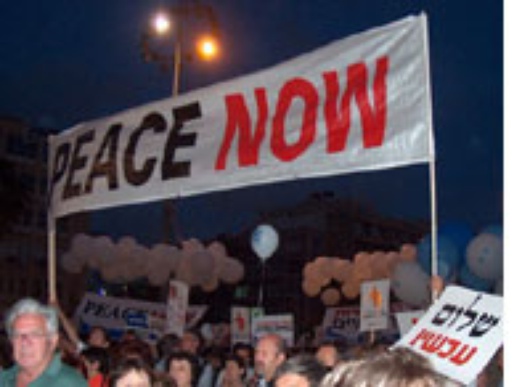Hope for peace
Published on
Professor Galia Golan of Peace Now, the internationally renowned Israeli peace organisation, writes for café babel on the prospects for peace following the Palestinian elections
 The Palestinian elections, primarily the January presidential elections but also the municipal and local elections begun in December and the elections for the Palestine Legislative Council scheduled for May, represent an important challenge. They are a challenge to Israel, specifically to Prime Minister Ariel Sharon, because they negate his claim that there is no political partner on the Palestinian side. Arafat’s passing eliminated the pretext Sharon had been using to avoid negotiations, namely the purported unwillingness of the Palestinian leader to reach peace. His replacement by means of an orderly transfer of power to Mahmoud Abbas, a leader who has consistently advocated negotiation rather than the use of force, is a change that will be difficult for Sharon to ignore. Moreover, Fatah’s choice of Abbas, also known as Abu Mazen, as its candidate for President has already lent much legitimacy to the path of negotiations. Indeed the pressure it put on Marwan Barghouti to withdraw his candidacy is a further sign of such legitimacy, given the fact that Barghouti, while an advocate of peace with Israel, is nonetheless the Fatah leader most associated with the return to armed struggle of the Intifada. If the coming elections, both local and parliamentary, provide further legitimacy to Mahmoud Abbas' path, Sharon and Israel will be faced with a most compelling new reality.
The Palestinian elections, primarily the January presidential elections but also the municipal and local elections begun in December and the elections for the Palestine Legislative Council scheduled for May, represent an important challenge. They are a challenge to Israel, specifically to Prime Minister Ariel Sharon, because they negate his claim that there is no political partner on the Palestinian side. Arafat’s passing eliminated the pretext Sharon had been using to avoid negotiations, namely the purported unwillingness of the Palestinian leader to reach peace. His replacement by means of an orderly transfer of power to Mahmoud Abbas, a leader who has consistently advocated negotiation rather than the use of force, is a change that will be difficult for Sharon to ignore. Moreover, Fatah’s choice of Abbas, also known as Abu Mazen, as its candidate for President has already lent much legitimacy to the path of negotiations. Indeed the pressure it put on Marwan Barghouti to withdraw his candidacy is a further sign of such legitimacy, given the fact that Barghouti, while an advocate of peace with Israel, is nonetheless the Fatah leader most associated with the return to armed struggle of the Intifada. If the coming elections, both local and parliamentary, provide further legitimacy to Mahmoud Abbas' path, Sharon and Israel will be faced with a most compelling new reality.
Moves towards democracy
The Palestinian elections will also be a challenge to the United States and, particularly, President Bush. The American president has placed “democratisation” at the top of his Middle East policy objective. And the Palestinians appear to be going further than any other Arab entity in actually undertaking such an endeavour. With a highly developed civil society, anxious to build democratic institutions, the Palestinian public has taken the democratic process seriously at grass roots level. Although the elections are not completely free from corruption or political pressures, so far they have been characterised by democratic procedures and orderly conduct. If this situation is maintained throughout the election process, the Palestinians will be well along the way to meeting much of President Bush’s demands. The rest of the Quartet (the EU, UN and Russian Federation) will be similarly challenged, for part of the Palestinians’ commitment to the first stage of the Road Map is indeed democratisation.
Moreover, to assist the democratic process, Israel has agreed to the withdrawal of its forces from Palestinian cities and towns (reoccupied after the beginning of the Intifada) and the removal of barriers and roadblocks within the territories for the few days of the voting. Here is Israel’s opportunity to fulfil the first stage of the Road Map, by extending this move and making it permanent. Thus the elections may actually create a basis for the beginning of the Road Map, particularly if the legitimacy they provide for the new leadership enables it to meet the other requirements of the first stage: namely to reorganise and unite the Palestinian security services, declare a cease-fire and undertake the cessation of violence.
Reasons for optimism
Undoubtedly this is an optimistic view of the situation and its prospects. But such optimism is perhaps supported by two developments. The first is the change that is already apparent among the Palestinian public. The most recent surveys indicate a rise – to the level of an absolute majority – in the support for an end to the violence and for the two-state solution. According to one study, the Palestinian public is not convinced the new leadership will be able to bring about the necessary changes but, nonetheless, the majority does believe that there are better chances for peace now. The same guarded optimism was also found amongst Israeli respondents. Both societies appear to be ready to put violence behind them. There is a sense on both sides that there has been enough bloodshed – and that it has not brought us closer to peace. Indeed the opposite is true. Given the enormous hardships and loss of lives over the past four years of hostilities, scepticism is still very high regarding the willingness of the other side to make peace. But the second reason for optimism is that the challenge presented to Israel, the United States and the rest of the Quartet by the election of a new, legitimate and peace-seeking Palestinian leadership may well lead to a resumption of negotiations, overcoming the scepticism and placing us back on the road to peace.



